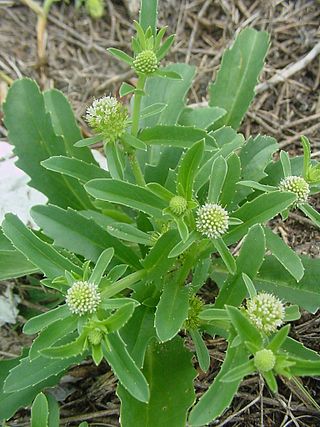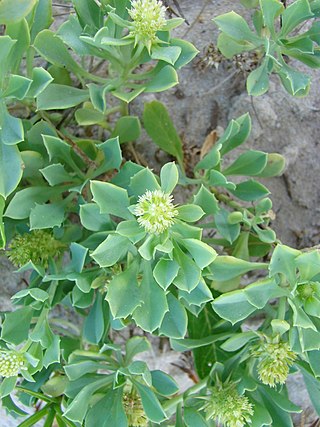
Lycium is a genus of flowering plants in the nightshade family, Solanaceae. The genus has a disjunct distribution around the globe, with species occurring on most continents in temperate and subtropical regions. South America has the most species, followed by North America and southern Africa. There are several scattered across Europe and Asia, and one is native to Australia. Common English names for plants of this genus include box-thorn, wolfberry, and desert-thorn. Plants of the World Online currently accepts 101 species. Other estimates are of 70 to 80 species.

Schinus is a genus of flowering trees and tall shrubs in the sumac family, Anacardiaceae. Members of the genus are commonly known as pepper trees. The Peruvian pepper tree is the source of the spice known as pink peppercorn.

Azorella is a genus of flowering plants in the family Apiaceae, native to South America, New Zealand, southeastern Australia, and the islands of the Southern Ocean.

Calyceraceae is a plant family in the order Asterales. The natural distribution of the about sixty species belonging to this family is restricted to the southern half of South America. The species of the family resemble both the family Asteraceae and the Dipsacaceae.

Haplopappus is a genus of flowering plants in the family Asteraceae found in South America, mostly restricted to the dry regions of the Southern Andes, Chilean Matorral, and Patagonia.
Gamocarpha falklandica, also called false-plantain, is a species of perennial plant in the Calyceraceae family. It is endemic to Falkland Islands. Its natural habitat is rocky shores.

Nassauvia is a genus of flowering plants in the tribe Nassauvieae within the family Asteraceae. It is native to Argentina, Bolivia, Chile and the Falkland Islands.

Adesmia is a genus of flowering plants in the legume family, Fabaceae. It was recently assigned to the informal monophyletic Adesmia clade within the Dalbergieae.

Distichlis is a genus of American and Australian plants in the grass family. Plants in this genus are dioecious, have rhizomes or stolons, and have conspicuously distichous leaves.

Tristagma is a genus of South American plants in the onion subfamily with the Amaryllis family. It is native to South America but one of the species (T. uniflorum) has become naturalized in various other places.

The Solanaceae, or the nightshades, are a family of flowering plants that ranges from annual and perennial herbs to vines, lianas, epiphytes, shrubs, and trees, and includes a number of agricultural crops, medicinal plants, spices, weeds, and ornamentals. Many members of the family contain potent alkaloids, and some are highly toxic, but many—including tomatoes, potatoes, eggplant, bell and chili peppers—are used as food. The family belongs to the order Solanales, in the asterid group and class Magnoliopsida (dicotyledons). The Solanaceae consists of about 98 genera and some 2,700 species, with a great diversity of habitats, morphology and ecology.

Calycera is a genus of flowering plants in family Calyceraceae endemic to South America. It formerly contained up to 14 species. Six are currently accepted.

Junellia is a genus of flowering plants in the verbena and vervain family Verbenaceae, native to the Andes, Patagonia, and the Falkland Islands.
Moschopsis is a genus of flowering plants in the family Calyceraceae, native to the Andes of Chile and Argentina in southern South America. They are compact perennial succulents appearing somewhat like small heads of broccoli or artichokes.

Boopis is a genus of flowering plants in the family Calyceraceae, which includes two species native to Argentina, central Chile, and Uruguay. The taxon formerly included more species. It was found to be highly polyphyletic, and several species were moved to other genera.

Acicarpha is a genus of flowering plants in the family Calyceraceae, native to drier areas of southern South America. They prefer to grow alongside rivers or the shores of the Atlantic Ocean.
Lecanophora is a genus of flowering plants belonging to the family Malvaceae.
Leucocera is a genus of flowering plants in the family Calyceraceae. It includes seven species native to northwestern and southern Argentina and central and southern Chile.
Anachoretes castillonii is a species of flowering plant in family Calyceraceae. It is a perennial endemic to the Sierra de Ambato in Catamarca Province of northwestern Argentina. It is the sole species in genus Anachoretes.
Asynthema gracile is a species of flowering plant in family Calyceraceae. It is a perennial native to western and southern Argentina and central Chile. It is the sole species in genus Asynthema.














